FARA 2019 Symposium Edition
The 22nd Annual International Training Symposium wrapped up on Thursday May 9th with close to 60 attending.
This years host hotel was the Crowne Plaza Tampa Westshore in Tampa Florida.
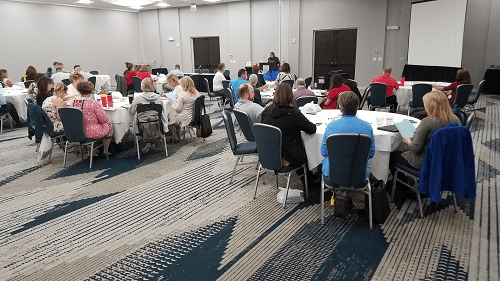
Membership Meeting
By Brad Shipp
Reports were given on financial status and committee activities.
The following leaders were elected:
- • Vice President-Electronic Security – Sherry Couey, Alarm Coordinator, Fayetteville Police Department
- • Secretary- Meredith Wivell, False Alarm Reduction Coordinator, Frederick Police Department
- • Associate Director-Electronic Security – Jordon Brown, Arkansas Security Alarm Association
The two annual awards were persecuted – See below.

2019 Norma Beaubien Public Safety Member of the Year Award
By Brad Shipp
Alberto Hook brings professionalism with good humor and a willingness to help to all his endeavors. for these reasons and more Alberto Hook was awarded the 2019 Norma Beaubien Public Safety Member of the Year Award.
Alberto became the Director of the False Alarm Reduction Section for the Montgomery County Police Department in Gaithersburg MD in April of 2013. While at the Department he has reduced the number of false alarms to which police officers must respond by 65%, while at the same time the alarm user base has increased by 151%. The section has generated $1.2M in revenue through fees, application of fines and citations. He transitioned to a new false alarm reduction tracking and billing software program that saved the County about 80% ($800,000) per year in expenditures.
Since joining the Section, Alberto has been involved in FARA, attending symposiums and local chapter meetings. He has helped with the annual financial audit of FARA and presented at sessions at the Austin. Nashville, Seattle & Tampa Symposiums
Alberto is the Mid-Atlantic Chapter President and serves on the Training and Communications committee. He has also completed the MDBFAA Level 1 Certified Alarm Technician course.
In his spare time, he manages an adult evening soccer program and as a board member for Ninos Unidos de Montgomery County. This charity provides financial assistance to disadvantaged and at risk children to attend after school activities. offers tutoring and mentoring programs, drop-out prevention. liaison advocacy for Hispanics
Prior to working at Montgomery County, Alberto served as Compliance Officer for several financial institutions.
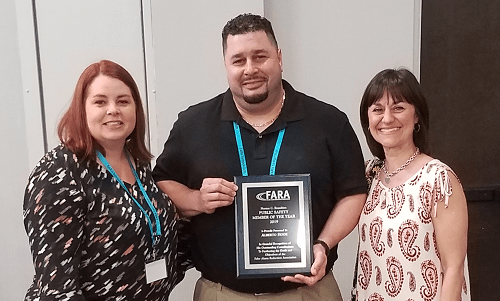
Shown above Kerri McDonald, Alberto Hook and his wife Marjorie
2019 W. Rex Bell Associate Member of the Year Award
By Brad Shipp
Kelly Ryan brings a can do attitude with a positive outlook to everything he does – for these reasons and more Kelly Ryan was awarded the 2019 W. Rex Bell Associate Member of the Year Award.
Kelly Ryan became VP Sales & Marketing at Dispatch Center, LTD in 2014. Prior to that he worked in several capacities with Honeywell – ADI from 1999-2014. He worked for ADT in Technical Service from 1997-1999 and began his adventure in the alarm industry in sales with Action Alarm Company in 1993.
Kelly became active in the Texas Burglar and Fire Alarm Association (TBFAA) in 2006. Since that time he has served including stints as Convention and Legislative committee member, Associate Director, Vice President and in his current role as President. Kelly has represented TBFAA on the NESA board since 2015.
Kelly has presented at several symposiums. He became FARA Fire Associate Director in 2017. He is a active in sending out FARA Social Media Messages and is currently working to help start FARA chapters in Texas..
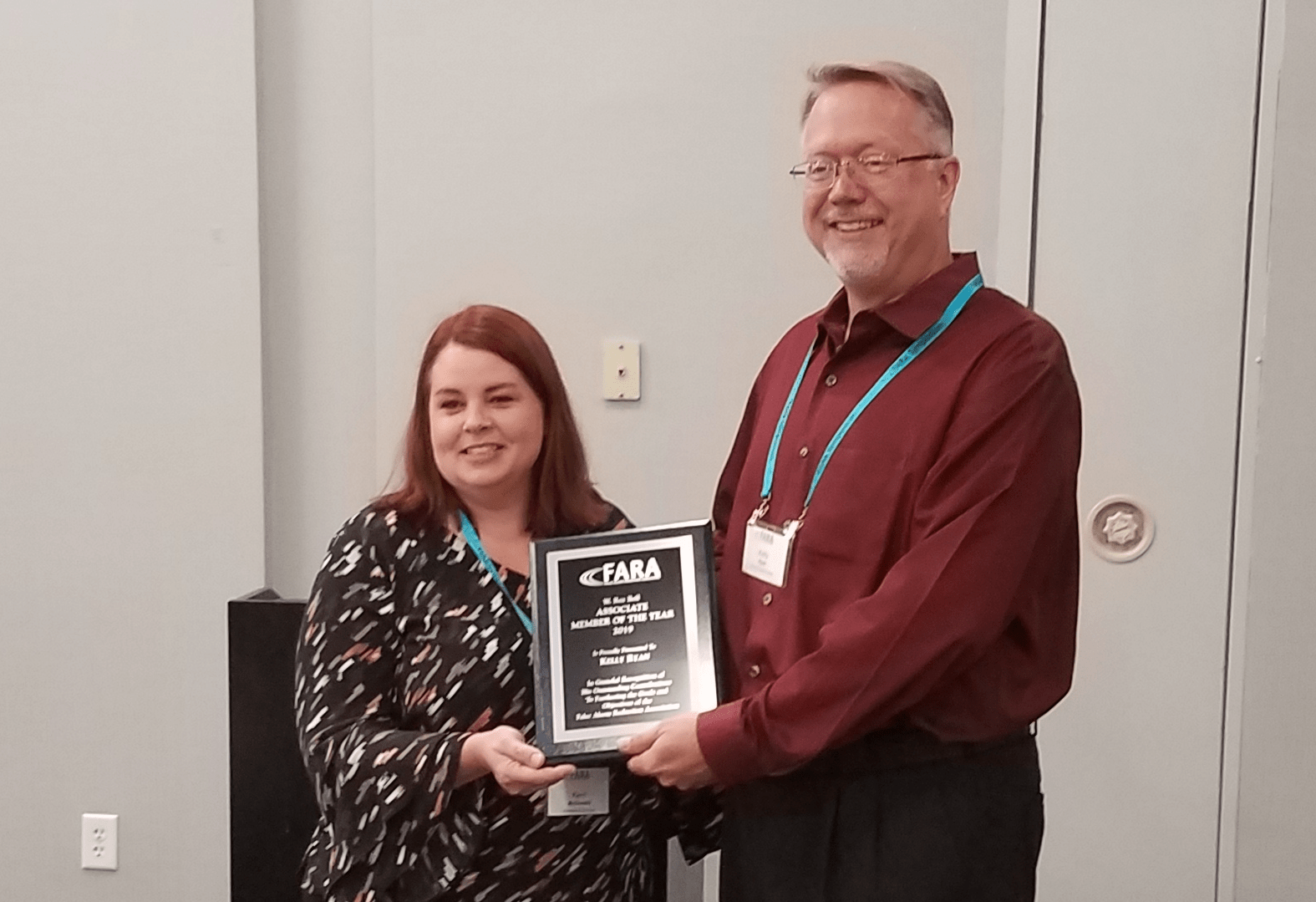
Shown above Kerri McDonald & Kelly Ryan
New Attendee Session & Opening Session
By Kerri McDonald
The 2019 Annual FARA Symposium kicked off with a New Attendee Session. The new attendees were welcomed, given a brief overview of FARA’s benefits and tips on how to get the most of the Symposium.
After the New Attendee Session, we rolled right into the Opening Session! During the opening session, all the attendees got the opportunity to do self-introductions. The attendees were reminded to please use the Grupio App and turn in the evaluations.
We recognized and thanked our supporters, National Electronic Security Alliance (NESA), Texas Burglar & Fire Alarm Association (TBFAA), Arkansas Security Alarm Association (ASAA), Maryland Burglar & Fire Alarm Association (MBFAA), Oklahoma Burglar and Fires Alarm Association (OKBFAA), Vector Security and J Gardner and Associates.
The Opening Session was completed with an informative visit from Tampa’s Visitors Bureau.
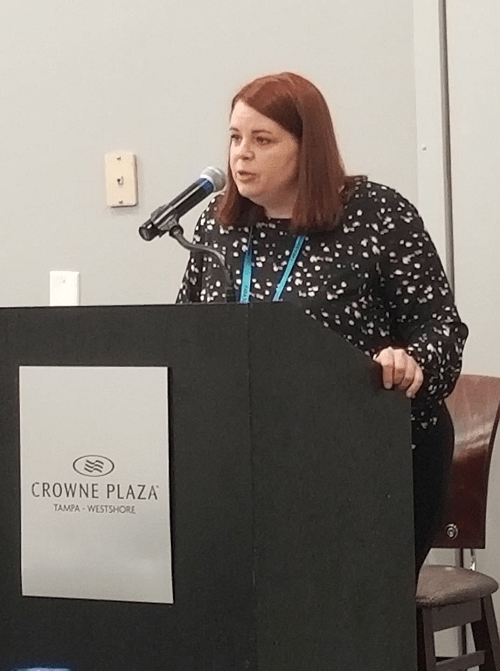
Data Driven False Alarms Solutions
By Sherry Couey
David Budzinski and Jon Marc Dangaran of Johnson Controls explained in this session, how the use of data gathered from intrusion alarm panels could be used to educate alarm users.
David gave the audience an overview of Johnson Controls new program of using machine learning algorithms to collect the information and its uses. This program provides insight for their commercial customers on where and how false alarms occur in within the customer’s business. The program also allows Johnson Controls to assist its customers on how to address false alarm problems when they occur.
Overall the class provided an exciting glimpse into the future of addressing false alarm issues.

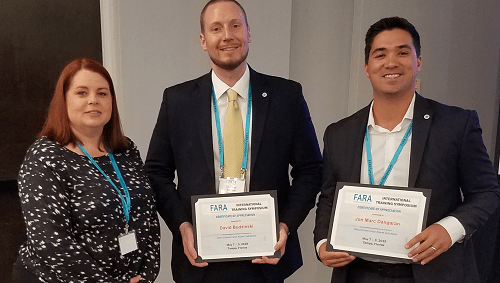
Avoid Surprises At Your Legislature
By: Meredith Wivell
Brad Shipp and Alberto Hook provided an excellent presentation to the group on how to avoid surprises at your legislature. The speakers had plenty of knowledge and experience to share with the group. Brad is no stranger to legislative sessions. Brad was able to break things down, piece by piece for the group as the process itself can be overwhelming.
Start by always staying informed. We do this by tracking legislation in and around our areas. Brad has added features to the InfoLink that address current/proposed legislation that may be impacting areas around the region. You also should know when your legislation is in session. For public safety, each jurisdiction has some type of involvement at the state levels. It is best to familiarize what associations your chief is involved with. Each association has lobbyists that are represented during session. The goal is to ensure your concerns/voices are heard so that they can be properly communicated. You may consider sharing an impact statement via your chain of command, who can then approve you to speak on behalf of the agency and/or getting other groups depending on jurisdiction.
Next, you should research the bill. Read the bill in its entirety. Ask your legal department for clarification on terms/definitions proposed to fully identify potential impacts. Make sure that there aren’t any hidden items that you might not be aware of from the initial summary. Find out who the authors, sponsors, co-sponsors are. Find out what committee the bill will be introduced to. The specifics of these things are important to know in advance. Research committee members to identify if there will is someone with local representation from your area. Look for common interests that you may share with members prior to initial contact. Meet with committee members prior to the scheduled hearing, if possible. When preparing for the meeting, try to bring someone locally with you that can help advocate on/for your position. Also, you need to know if the bill is being introduced in both the house/senate and/or if there is a companion bill. If so, you will need to repeat the process for researching the companion bill.
Finding out when the first reading will occur and when it will go before the committee are vital in cohesively working out the logistics of who shares your position on the bill. Figure out who is able to offer written testimony. If you have representation from your jurisdiction on the committee, ensure your local counsel has already reached out to them to voice your concerns/potential impacts. If possible, obtain permission via your chain of command to attend the hearing in person to offer oral testimony. There is strength in numbers. There are strict deadlines for signing up for oral testimony the day of and for submitting written testimony. Double check these deadlines and ensure the logistics are worked out in advance.
Preparing for the hearing is extremely important. Looking professional, speaking clearly and concisely are crucial to your success. There are also time limits on oral testimony. For written statements, ensure that the committee members will each have a copy and that have enough time to read your position prior to the hearing. If a group of people have a collective interest in a position, ensure that each of you address varying key points of interest so that you are not repeating what someone else has already said. These committee members spend long days while in hearings and hear many diverse bills throughout a typical day. Look to make eye contact with members and try to connect with them during your brief encounter. Ensure that you are a subject matter expert by doing your homework and be prepared to answer questions. If you don’t know the answer, tell them you will get the answer so that it can be recorded on the record. Brad shared a great video on tips on testifying that would be a great tool to watch before your journey. Each state/providence is different and may conduct hearings differently. There are videos available on what to expect during hearings as well. If you can get down to the committee where your bill is being introduced to see how they operate, may be your best way to familiarize yourself with expectations.
The class concluded with Alberto sharing firsthand information on what his experience looked like in Maryland, after participating in two legislative sessions. He offered tips on what worked for his jurisdiction and welcomed questions from the group.
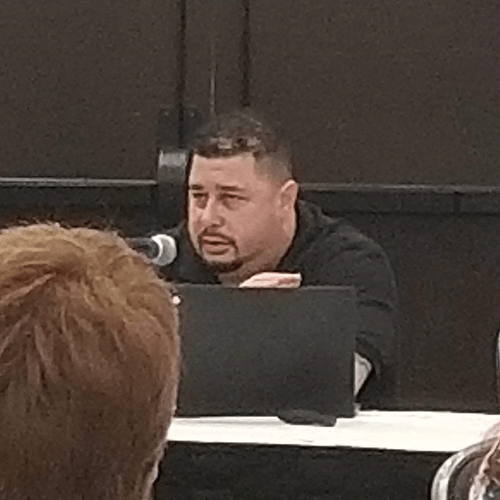

Stop Repeat Offenders
Tammy Foxworthy, CAM
Craig Allen and Craig Bober joined forces to bring us information on how to stop repeat offenders from the industry and public safety viewpoints.
Alarm installation and alarm monitoring companies help stop false alarms before they start. The industry uses numerous strategies to deal with reoccurring false alarms. For example, make disarming alarm systems and alarm cancellations easier, auto stay arming, use two-way voice between the central station/alarm user and install better technology.
Public safety can help prevent additional false alarms with fines and education. Chronic false alarm activations are often due to inadequate employee training or inferior systems that have not been upgraded. Apply the problem-solving model SARA (scan, analyze, response, assessment) when dealing with repeat false alarms.
This class showed different ways to achieve the same goal of preventing repeat false alarms.

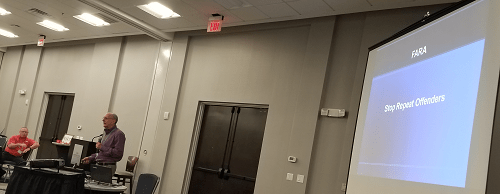
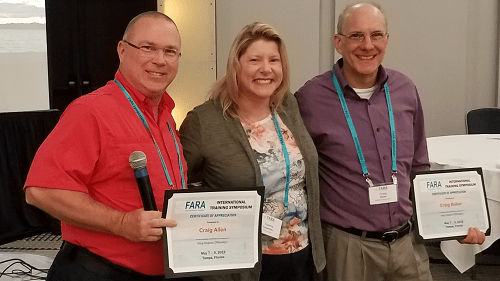
Tampa Treasure Hunt
By Kerri McDonald
The Symposium Committee wanted to make sure we did a team building exercise so we had another FARA Treasure Hunt!
We had to divide into teams and take a bus to the river walk area of Tampa. Once we were there, you had to read the clues, find the places and take a picture.
We got to see the Ybor City Museum, Centennial Park, the Freddie Solomon statue, Jose Marti Park, Heroes Plaza and the Tampa Police Memorial.

More On Marijuana
By Julie Rush
Vinnie Ferraris with the Portland Police Bureau Alarm Administration Unit, presented an update to the Seattle symposium class, Dealing with Legal Marijuana. The information provided was very pertinent to the attendees since many U.S. states and Canada have approved marijuana for either medical and/or recreational use. Currently in the U.S., only four states consider marijuana to be illegal for any use.
Vinnie discussed the differences between federal and state law, the recent legalization of marijuana in Canada, Oregon surveillance requirements, and resources available to research these locations. He also provided and overview of the challenges facing alarm administrators and first responders.
For alarm administrators, challenges include addresses not found, difficulty in finding a responsible party, missing unit numbers on warehouse facilities that house many cannabis businesses, and the confusion of these businesses operating under a DBA, while requesting a permit to the LLC name. For responders, there can be unknown hazards at marijuana grow facilities, armed security, and difficult to locate addresses that can result in a delay, or sometimes prevent, a response.
Solutions for alarm administrators to verify an address or a responsible party included:
- Utilizing state enforcement websites to locate approved licenses, or the LLC and DBA of a marijuana business
- Using your state business registry to find a mailing address or a responsible party
- Researching CAD for property details
- Researching your county assessor records
- Asking your officers for additional property information
- Google Earth
- Using an investigative research data base like TLO or LexisNexis
Challenges are on the horizon for law enforcement agencies around the United States and Canada due to the rapid growth of this industry. Weather your state has legalized marijuana for only medical use, or both medical and recreational use, it will affect your agency.
Facilities that that grow, process, warehouse and sell marijuana have very strict security requirements. These requirements can translate into large volumes of new alarm installations, issuing more permits, and the potential to increase in your false alarm rate. Vinnie stressed the importance of preparing ahead of time, and to know what your resource options are.

Are You Certifiable?
By Kerri McDonald
This year the Symposium Committee wanted the attendees to benefit from concurrent classes. One of those classes was “Are You Certifiable” taught by Sherry Couey.
Sherry was well prepared, had a lot of information and did a great job teaching this class.
Hopefully everyone who attended the class is now ready to take FARA’s online Certified Alarm Manager exam.
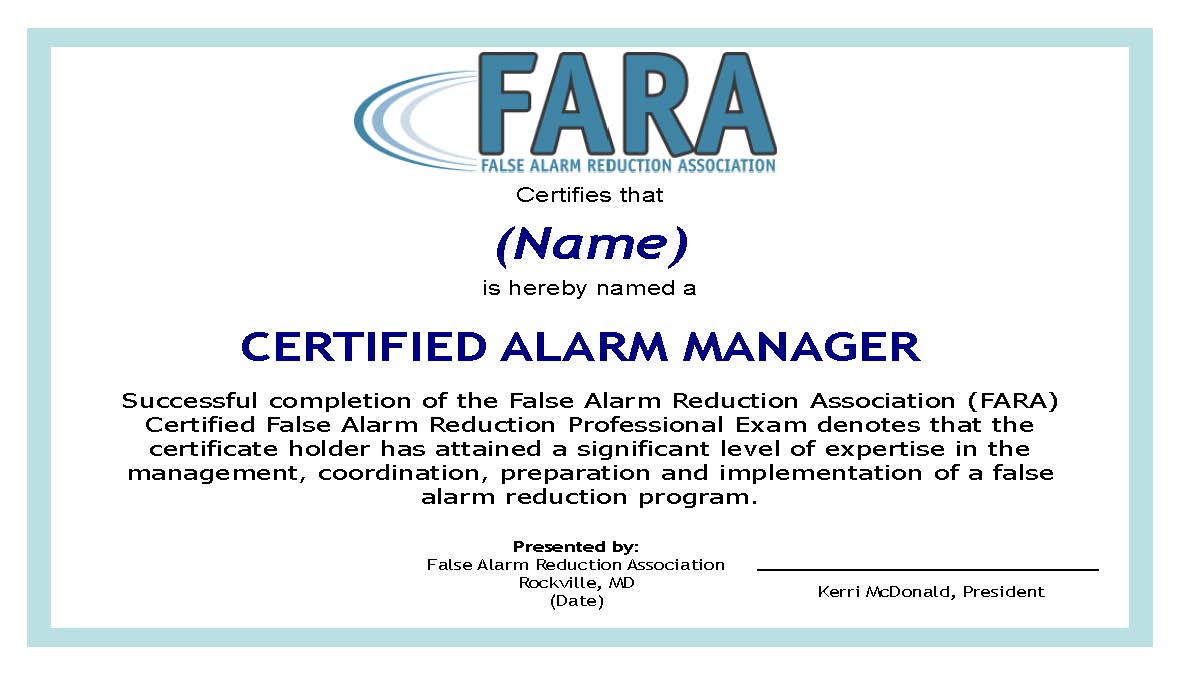
Avoid Duress, Dealing with Panic & Holdup Alarms
By Craig Allen
Brad Shipp presented on the topic of duress and panic alarms titled, “Avoid Duress Dealing With Panic and Holdup Alarms”.
There are many names for this button to get a quick response that causes a lot of issues for Public Safety. Brad highlighted the many different types of equipment. He covered the various applications of these devices.
Brad also discussed PERS (Personal Emergency Response Systems) that may be a problem for some jurisdictions.
Attendees were cautioned to look at policy versus ordinance changes but to consult the FARA Model Ordinance for guidance.

What About Fire?
By Kerri McDonald
One of our other concurrent class was “What About Fire?”
We knew this would be a small class since there are not a lot of alarm coordinators who are also tasked with reducing false fire alarm calls.
The group of attendees were able to participate in a round table discussion regarding fire alarm ordinances and how fire alarms differ from burglar alarms.

Track Down Contact Information
By Amanda Garner
For any agency that collects their own false alarm fees, this information is invaluable! The dreaded “RETURN TO SENDER” yellow sticker on the mail is a constant challenge to my department. I learned a couple of new tricks for finding alternative addresses at this Symposium.
Talking to your officers can be very helpful. I have found that most of my officers have no idea what my job entails. Often times they have no idea WHY I need them to put notes on the calls and how I use that information. The officers might know a business has closed recently or that the owner of the property has other locations where the mail might not be returned.
If your municipality has their own water, trash, sewer or electricity see if there is a different mailing address for the utility bills. If there is construction being done on a building (new tenant) check the building permits for an alternate address. Real Property searches can also be helpful for finding the legal owner.
The golden nugget for me from this class was posting notices on the premise if the mail is being returned. Light duty officers, Volunteers In Policing, cadets or grave shift officers can be a good resource to drive to the location if your schedule does not permit. I am looking into what it will take to have our VIPs, who currently do the Vacation Checks, post notices at the locations.


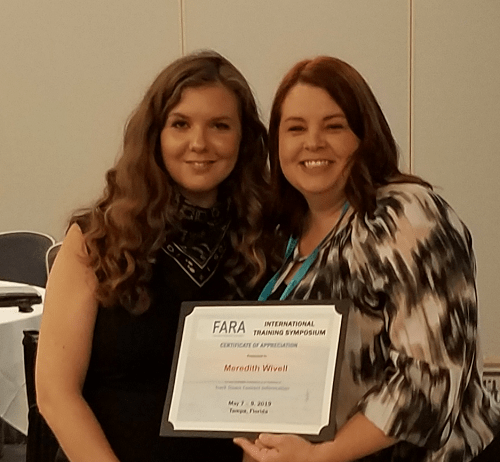
Lunch & Learn-Staying Healthy in Your Job
By Kerri McDonald
Once again, the Symposium Committee wanted to do something different this year.
Jennifer Waskovich who works for Hillsborough County came out and gave us great ideas on how to stay health.
So many of us sit all day long and rarely move from our workstations.
Jennifer was great at providing us all the ways we could stay health at work.

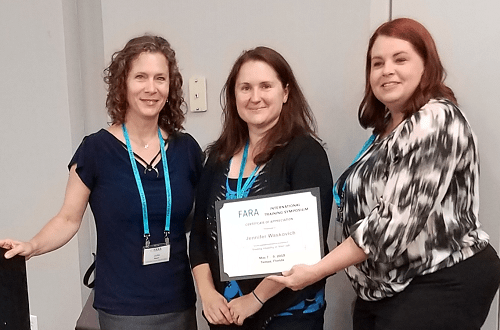
Take a Walk on the Monitoring Side
By Kerri McDonald
On Wednesday afternoon after our Lunch & Learn, we had the privilege of having Afornia Hawthorne from Vector Security and Jordon Brown from GuardTronic, Inc. teach our next class. Take a Walk in Their Shoes-Monitoring Companies provided public safety a good view into what a monitoring station does.
Afornia and Jordon talked about all the different type of signals a monitoring station can receive and how they respond to each of them.
We learned about cancellations, how they verify alarm calls and how they train their operators.
They provided information on how their customers can know it is their alarm company calling them and not just another 800 number they ignore. We got to hear about monitoring contracts and how monitoring station can work with different alarm dealers.
The information Afornia and Jordon provided was very informative and useful for public safety.
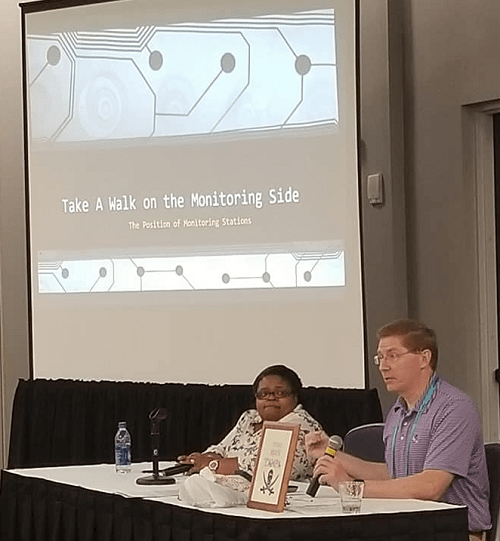


Fining Alarm Companies – Pros And Cons
Presented by: Chris Russell, Karen Derry, Kerri McDonald and Melissa Gill
Chris Russell explained that Texas state law prohibits a municipality form fining an alarm company. However, an alarm company can be required to register.
Karen Derry explained that policies in Canada are different with every city and/or province. Hamilton decided that because alarm companies were not registering their alarm users and the false alarm rate was extremely high that they would fine the alarm companies for the dispatches. The biggest opponent was dealer/installer. Users were all for it and it was an easy sell to alarm monitoring stations.
Chris Russell said that when you fine the alarm company it is not fair because the alarm company cannot make the customer repair/fix the alarm system.
Karen Derry said that if you fine the alarm company, the alarm company adds an administrative fee to the customer.
When asked when the alarm industry would agree to bill the alarm companies or monitoring services – Chris Russell answered. When the alarm company has direct responsibility for the alarm.
Karen Derry reported that fining alarm companies has reduced false alarms. In 2014 there were 7195 false alarm calls; in 2018 there were 4753 false alarm calls. It has reduced false alarms 1000 calls per year.
Melissa Gill explained that Vector Alarm Services offers a service to handle things for some customers. They handle permit application & renewal, updates and false alarm fines.
Karen Derry relayed that private guard services can be used for chronic false alarm sites, such as construction sites.

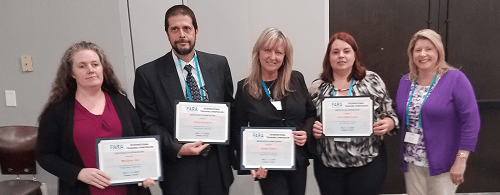
Not Your Grandmas False Alarm
By: Sue Smeltzer
Presented by Kelly Ryan, President, Texas Burglar & Fire Alarm Association (TBFAA)
The false alarm definition is changing with the addition of DIY, MIY, PERS & video monitoring. Alarm companies are realizing digital telephone lines aren’t working so well now. More Voice over IP (MOIP) lines are being used. Alarm companies should not reuse previously used account numbers.
If using ECV, keep phone lists updated. Some systems use Audio for 2 way voice communications after and alarm. Alarm users are purchasing cameras based on price not quality. The quality is very important. Alarm companies use photos from production or high quality cameras when advertising. If you purchase an inexpensive camera the quality of the video will not be the same as you saw in the alarm company’s demo. Video monitoring only looking for threats, then reviewed, called in as suspicious person.
Life Alert is a giant company in the PERS market and is growing. It’s unregulated as a stand-alone personal alarm. Owners want simple systems while their children want more complex bells & whistles.
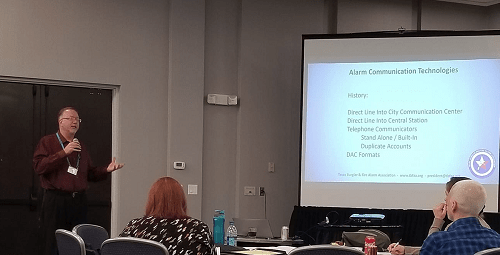
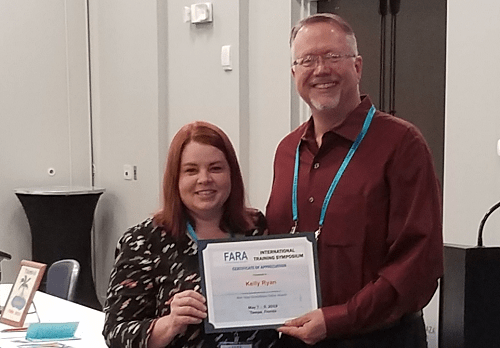
Tune Up Your Ordinance – To Deal With DIY & MIY
Presenters:
- City of Portland – Vinnie Ferraris, Alarm Program Coordinator
- Montgomery County PD – Alberto Hook – FARS Director
CITY OF PORTLAND
City of Portland wanted to update their ordinance which was last revised in 2003 to reflect current practices in the alarm industry. They needed to update burglary and alarm systems City Code and update definitions for alarm permitting including DIY installations. The goal was to assist with the reduction of alarm dispatches.
Where to start?
Vinnie created an ‘ordinance revision’ focus group. He invited various people from the community: business owner, construction industry rep, alarm monitoring companies, civic departments, senior’s rep, and a sergeant from each precinct.
He also created an Alarm Program Cost Recovery Analysis which details the officer costs and program administration costs for total program costs and revenues.
The focus group agreed on the scope of its group and asked the following questions:
- What are the expectations of the police response?
- What are expectations of the alarm unit?
- What are expectations of the alarm company?
- What are expectations of the permit holder?
- What makes a good policy?
The group also came up with general questions on the alarm ordinance itself.
Vinnie also created a survey card and it was sent to every permit holder via Survey Monkey asking for feedback on changes that should impact the goal of reducing false alarm response. Respondents were asked to rank what they felt was important in order from most desired to least. 4500 Responses were received.
Another step the City of Portland has taken is creating a ‘liability statement’ which will protect them. This statement reads that The City of Portland PD is not obligated to respond to alarm calls.
Regarding suspensions: Portland has a 5 year ‘time out’ or ‘suspension’, if someone has 5 alarms in one year. Then they must go to verified response or multi zone response to get back into the program.
DIY – how does Portland handle DIY users calling for dispatch, saying “ they don’t know who is at their home” ? Vinnie said they view those as a regular calls for service, not an alarm call. Same for Montgomery County – if they say they ‘see something’, they handle it as a call for service, not an alarm call.
Montgomery County
Montgomery County is updating the current ordinance, updating the technical standard as well as renewal fees and registration fees.
It has been submitted for what’s called the “comment’ review” period on January 1 where it ‘sits’ for 30 days. It has to be publicly viewed and comments noted.
It passed this stage and was then submitted on Feb 6th to the County Executive where it will be voted on; it remains open and pending as of this date.
Alberto presented the Fiscal Impact Statement from his department and a copy of the memo to the County Executive.
Alberto stressed that during a process like this and must be prepared for is that you may end up in front of a group of people who know nothing about alarms and how the changes will affect its constituents.
Re: DIY Alarm Installations: In regards to home and business owners installing their own alarm systems, getting DIY systems inspected poses problems. However, since Montgomery County already has a requirement that “third false alarms” require an inspection, this may help when it comes to false alarm issues with (poorly installed) DIY installations. Some equipment suppliers of ‘DIY systems’ will work with the homeowner and figure out what might be the problem, like a sensor issue, however, since it was not installed by an alarm company, there is no one to call to inspect the system if required.. DIY’ers may have to hire an outside alarm company to do the inspection.
DIY systems and when they are away from home/business : what steps do people take, if any, when they go on vacation to prevent false alarms?

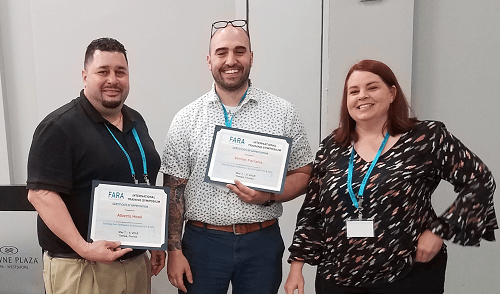
How to Collect
By: Alicia Vela
This lively session was presented by Debra Olsen, Unit Supervisor, of Fairfax County Police Department.
Debra began the discussion with a back-in-the-day song referencing money. Once she grabbed the room’s attention, she began talking about the challenges faced by jurisdictions when it comes to collecting fines for registrations and false alarms.
She gave advice on how to start collections from scratch. Rather than recreating the wheel, she suggested checking with other local agencies to create an MOU agreement and sharing the responsibility. Julie Rush of Clackamas County suggested having current stats ready and available for possible conversation with partner agencies. Whether choosing to do internal collections in conjunction with your legal and finance departments or outsourcing through a third party service, there is no one size fits all.
Debra shared that customer service skills are also key in successful collections. Courtesy calls to remind alarm users of their outstanding fines is the first step.
When faced with unhappy customers/citizens, remain calm and courteous and do not get involved in an exchange of words but rather end the call before it gets out of hand.
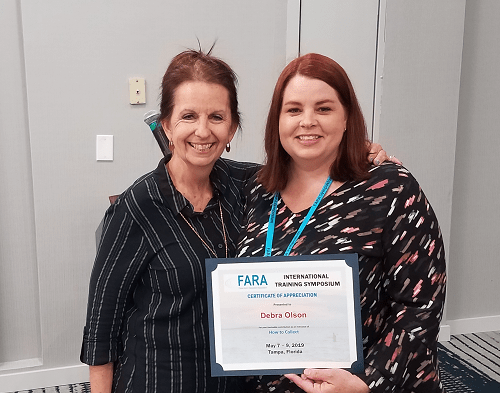
The Only Stupid Question
By Kerri McDonald
The last official class of the symposium was “The Only Stupid Question.”
Rick Moore was our host and he did a great job getting everyone asking questions.
This class was for all of the attendees who still had unanswered questions. We all know one of the best things about of FARA is the opportunity to talk with other people who do the same job.
Having this class was a way to provide one last networking opportunity before the symposium ended.

Wrap-Up
By Kerri McDonald
The wrap up always brings conflicting emotions. One I am glad the long week is over but I am sad because I am going to have to say good-bye to some wonderful colleagues. The one thing I think we all anticipate during the wrap-up is who won the 50/50 raffle.
This year’s winner was Sherry Couey! {Pictured at right with Tom Foxworthy.
Special thanks to Tom Foxworthy for all hid volunteer help with registration and ticket sales.
Don’t forget to plan on attending the 2020 Symposium and I look forward to seeing you in San Antonio, TX.

Join Us Next Year
Wyndham San Antonio River Walk
San Antonio, TX
APRIL 7-9, 2020

